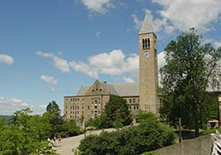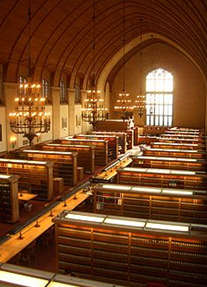

Uris Library and McGraw Tower

Cornell Law Library
The Cornell University Library is thelibrary system of Cornell University. In 2010 it held 8 million printed volumes in open stacks, 8.5 million microfilms andmicrofiches, more than 71,000 cubic feet (2,000 m3) of manuscripts, and close to 500,000 other materials, including motion pictures, DVDs, sound recordings, andcomputer files in its collections, in addition to extensive digital resources and the University Archives.[1] It is the sixteenth largest library in North America, ranked by number of volumesheld.[2]
Structure
The Library is administered as an academic division; the University Librarian reports to the university provost. The holdings are managed by the Library's subdivisions, which include 17 libraries on the main campus in Ithaca, New York; a storage annex in Ithaca for overflow items; the library of the Weill Cornell Medical College and the archives of the medical college and ofNew York–Presbyterian Hospital in New York City; a branch of the medical library serving Weill Cornell in Qatar campus in Doha; and the library of the New York State Agricultural Experiment Station in Geneva, New York.
The John M. Olin Library is the primary research library for the social sciences and humanities. The Albert R. Mann Library specializes in agriculture, the life sciences, and human ecology. The Harold D. Uris Library, with extensive humanities and social sciences holdings, serves as the primary undergraduate library. The Carl M. KrochLibrary includes the university's Rare & Manuscript Collections as well as its extensive Asia Collections. The Southeast Asia Collection at the Kroch Library, named in honor of John M. Echols, has been a joint undertaking of the university, the library, and the Southeast Asia Program with the goal of acquiring a copy of every publication of research value produced in the countries of Southeast Asia and publications about the region published in other parts of the world.[3]
History
Initially, the system was a collection of 18,000 volumes stored in Morrill Hall.Daniel Willard Fiske, Cornell's first librarian, donated his entire estate to the university upon his death, as did President Andrew Dickson White. Under Fiske's direction, Cornell's library introduced a number of innovations, including opening the stacks to undergraduate students, allowing undergraduates to check out books, and operating 9 hours per day from the earliest days of the library (instead of operating for only a few hours per week—as other libraries at American universities did at the time—just enough time for faculty to check out and return books), which allowed the patrons to use the facilities as a reference library
Initiatives
CUL plays an active role in furthering online archiving of scientific and historical documents. The arXiv.org e-print archive, created at Los Alamos National Laboratory byPaulGinsparg, is operated and primarily funded by Cornell as part of CUL's services. It has changed the way many physicists and mathematicians communicate, making theeprint a viable and popular form for announcing new research.
The Project Euclid initiative (named after Euclid of Alexandria) creates one resource joining commercial journals with low-cost independent journals in mathematics and statistics. The project is aimed at enabling affordable scholarly communication through the Internet. Besides archival purposes, primary goals of the project is to facilitate journal searches and interoperatibility between different publishers.
The Cornell Library Digital Collections are online collections of historical documents. Featured collections include the Database of African-American Poetry, the Historic Math Book Collection, the Samuel May Anti-Slavery Collection, the Witchcraft Collection, and the Donovan Nuremberg Trials Collection.
Rare holdings
The library houses several rare manuscripts. It houses one of the five copies ofAbraham Lincoln's Gettysburg Address (1863)—the only such to be privately owned and the only one accompanied both by a letter from Lincoln transmitting the manuscript and by the original envelope addressed and franked by Lincoln.[4][5] The library also houses cuneiform tablets, a major collection of medieval books and witchcraft trial records, thousands of pamphlets produced during the French Revolution, the correspondence between Jefferson and Lafayette, as well as "Birds of America" (the most expensive book in the world), first editions of the Book of Mormon (1830), of Darwin's "Origin of Species" (1859), and of Jane Austen's Pride and Prejudice(1813).[6][7]
Significant collections
• Samuel May Anti-Slavery Collection
• Witchcraft Collection
• Race and Religion Collection
• Fiske Icelandic Collection
• Asia collections
• Echols Collection on Southeast Asia
• Wason Collection on East-Asia
• South Asia Collection
• Agriculture collections
• The Core Historical Literature of Agriculture
• Home Economics Archive: Research, Tradition and History (HEARTH)
• Human Sexuality Collection
• Ornithology collection
• Making of America Collection
• Kinematic Models for Design Digital Library (KMODDL)
Movies and photos of hundreds of working mechanical-systems models at Cornell University. Also includes an e-book library of classic texts on mechanical design and engineering.
• Other digital collections
Units
• Adelson Library (Cornell Lab of Ornithology)
• Africana Library (Africana Studies and Research Center)
• Catherwood Library (Industrial and Labor Relations Library)
• Engineering Library (Cornell University College of Engineering, Carpenter Hall)
• Entomology Library (Comstock Hall)
• Fine Arts Library (Sibley Hall)
• Geneva Experiment Station Library
• Kroch Library: Asia Collections andRare and Manuscript Collections
• Law Library
• Management Library (Samuel Curtis Johnson Graduate School of Management,Sage Hall)
• Mann Library
• Mathematics Library (Malott Hall)
• Medical Library (Weill Cornell Medical Library)
• Music Library (Lincoln Hall)
• Nestlé Library (School of Hotel Administration Library)
• Olin & Uris Libraries
• Physical Sciences Library (Clark Hall)
• Veterinary Library (Flower-Sprecher Veterinary Library)
References
1. ^http://www.library.cornell.edu/aboutus/collections/strength
2. ^http://www.ala.org/ala/professionalresources/libfactsheets/alalibraryfactsheet22.cfm
3. ^http://asia.library.cornell.edu/ac/Echols/index
4. ^ "C.U. Holds Gettysburg Address Manuscript". The Cornell Daily Sun. April 6, 2005. Retrieved 2005-12-18.
5. ^ "Gettysburg Address". Cornell University Library. Retrieved 2007-12-19.
6. ^ "Gettysburg Address". Cornell University Library. Retrieved 2007-12-19.
7. ^ "Book of Mormon". Cornell University Library. Retrieved 2011-10-11.



















